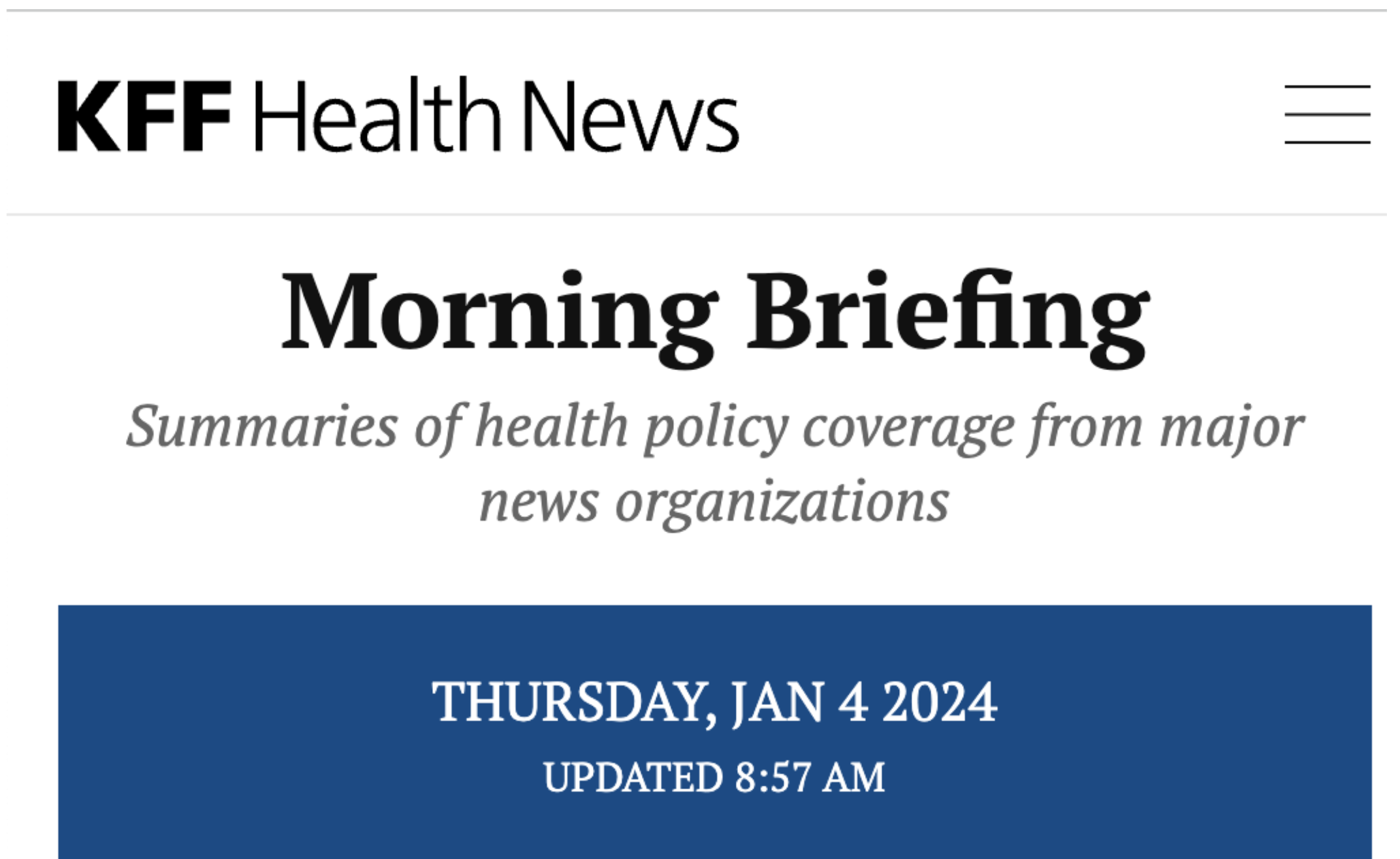KFF HEALTH NEWS ORIGINAL STORIES
Woman Petitions Health Insurer After Company Approves — Then Rejects — Her Infusions
Even people with good insurance aren’t guaranteed affordable care, as this KFF Health News follow-up to one patient’s saga shows. (Lauren Sausser, )
Doctors Are as Vulnerable to Addiction as Anyone. California Grapples With a Response.
The Medical Board of California, which licenses MDs, is developing a program to evaluate, treat, and monitor doctors with alcohol and drug problems. But there is sharp disagreement over whether those who might volunteer for the program should be subject to public disclosure and over how much participants should pay. (Bernard J. Wolfson, )
Political Cartoon: ‘Blood Test or AP Test?’
KFF Health News provides a fresh take on health policy developments with “Political Cartoon: ‘Blood Test or AP Test?'” by Clive Goddard.
SUMMARIES OF THE NEWS
Novel Roche Antibiotic Works Against Dangerous Drug-Resistant Bacteria
Researchers at Roche have developed a novel antibiotic with the ability to fight a dangerous drug-resistant bacteria that kills in up to 60% of infections. In a pair of articles published Jan. 3 in Nature, Roche and Harvard University scientists described how they developed a new antibiotic that is effective against carbapenem-resistant acinetobacter baumannii—also known as CRAB—in mice. The drug, zosurabalpin, works by interrupting construction of the bacteria’s outer membrane. … CRAB is a common culprit in hospital-acquired sepsis and other infections, and is at the top of the list of both the World Health Organization’s and the Centers for Disease Control’s “priority pathogens” for which new drugs are urgently needed. (Floersh, 1/3)
Zosurabalpin is in its own chemical class and has a unique method of action, says Dr. Kenneth Bradley, the global head of infectious disease discovery with Roche Pharma Research and Early Development and one of the researchers. (Musa, 1/3)
Under a microscope, this drug-resistant superbug looks as benign as a handful of pebbles. Yet carbapenem-resistant Acinetobacter baumannii, or CRAB, is a nightmare for hospitals worldwide, as it kills roughly half of all patients who acquire it. (Purtill, 1/3)
A study conducted in a New York City health system identified several patients infected with dual-carbapenemase–producing organisms (DCPOs), researchers reported late last week in JAC-Antimicrobial Resistance. The study authors say the findings are concerning. “Infectious diseases physicians should be aware of this threat, as our study shows high mortality in patients infected or colonized with DCPOs,” they wrote. (Dall, 1/3)
CVS Will Soon Recommend Biosimilars Instead Of AbbVie’s Humira
CVS Health will drop the rheumatoid arthritis drug Humira from some of its lists of preferred drugs for reimbursement as of April 1 in favor of rival biosimilars. Separately, news outlets report on how more Americans will pay just $35 a month for insulin treatments now that the price cap is in effect.
CVS Health said on Wednesday it will remove AbbVie’s blockbuster rheumatoid arthritis drug Humira from some of its lists of preferred drugs for reimbursement as of April 1, and will recommend biosimilar versions of the medicine instead. CVS said Hyrimoz and an unbranded version of Humira, both from Swiss drugmaker Sandoz, will be covered across all its formularies, while branded and unbranded near copies of the drug from India’s Biocon will be covered on some reimbursement lists. (Wingrove, 1/3)
A price cap on insulin from one of the three major manufacturers took effect on New Year’s Day, giving more Americans with diabetes more affordable treatments. … As of Jan. 1, 2024, Sanofi cut the price of Lantus by 78% and short-acting Apidra by 70%. The price cuts will reduce the cost of the drug for most patients at $35 through either price caps or savings programs. (Al-Arshani and Alltucker, 1/3)
Scientists have found a way to help Alzheimer’s drugs seep inside the brain faster — by temporarily breaching its protective shield. The novel experiment was a first attempt in just three patients. But in spots in the brain where the new technology took aim, it enhanced removal of Alzheimer’s trademark brain-clogging plaque, researchers reported Wednesday. “Our goal is to give patients a head start,” by boosting some new Alzheimer’s treatments that take a long time to work, said Dr. Ali Rezai of West Virginia University’s Rockefeller Neuroscience Institute, who led the study. (Neergaard, 1/3)
The US Food and Drug Administration is evaluating reports of side effects such as hair loss and suicidal thoughts in people taking medications like Ozempic, Mounjaro and Wegovy. These drugs, known as GLP-1 receptor agonists, are approved to treat diabetes or weight loss. They include semaglutide, branded as Ozempic, Rybelsus and Wegovy; liragutide, branded as Saxenda and Victoza; and tirzepatide, branded as Mounjaro and Zepbound. They mimic GLP-1, a hormone made naturally in the body whose roles include slowing the passage of food through the stomach. (Dillinger, 1/3)
A federal appeals court on Wednesday ordered the U.S. Food and Drug Administration to reconsider its decision barring two makers of flavored liquid for e-cigarettes from marketing their products, saying the agency had been arbitrary and capricious in refusing to consider the companies’ marketing plans. The 9-5 decision by the New Orleans-based 5th U.S. Circuit Court of Appeals reversed a July 2022 decision by a three-judge panel of that court. (Pierson, 1/3)
A startup that created a voice-based AI app to manage insulin and other prescriptions is launching Thursday with backing from powerhouses including Mayo Clinic and Eli Lilly. (Reed, 1/4)



